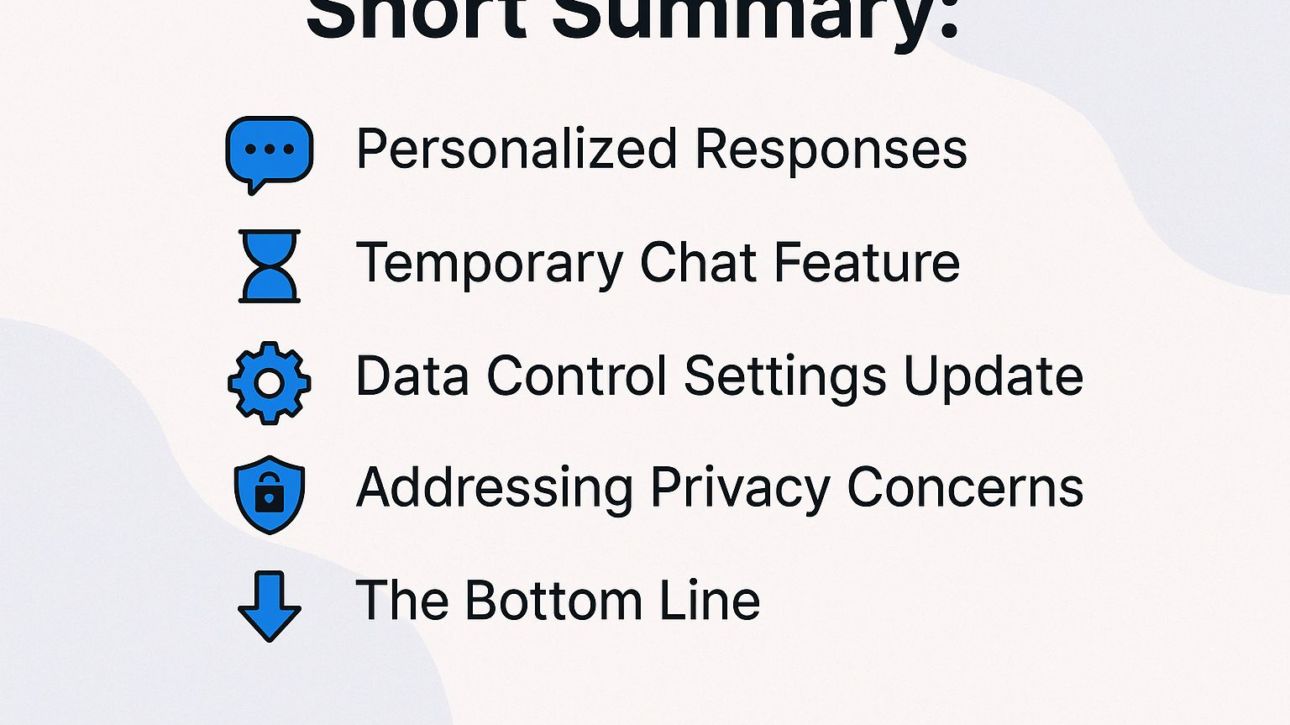Google has recently unveiled significant enhancements to its Gemini AI, focusing on memory features and user control options that elevate the personalization and privacy in chatbot interactions.
Contents
Short Summary:
- The Gemini AI can now recall past conversations for tailored responses, making chats more personalized.
- A new Temporary Chat feature allows users to have one-off conversations with privacy guaranteed.
- Updated data control settings enhance user agency over how their information is stored and utilized.
As the competitive landscape for AI continues to evolve rapidly, Google is making strides with its Gemini AI, implementing features designed to enhance user experience while maintaining a critical focus on privacy. On Wednesday, Google announced the rollout of several pivotal updates to Gemini, which will now give users the ability to revisit previous conversations for a more contextualized and personalized interaction. This shift aims to streamline the way users engage with the assistant, reducing repetitive explanations and creating a more intuitive dialogue flow.
With these enhancements, Gemini AI stands out by implementing memory features reminiscent of those found in ChatGPT. The ability to remember details from prior chats allows the AI to evolve in its understanding of user preferences, essentially enabling it to act more like a coworker who is attuned to your specific needs rather than a generic tool responding to isolated queries.
Personalized Responses
The central feature in this update is what Google calls the ‘Personal Context’ capability. This functionality means that Gemini can store and recall pertinent details from past interactions. For instance, if you mentioned your favorite hobbies or specific interests during prior chats, Gemini could reference that information to provide significantly more relevant responses in future interactions.
“Today’s update aims to create an AI assistant that learns and understands you—not one that just responds to prompts in a generic way,” explained a Google spokesperson during the release.
Imagine this: You previously discussed your love for Japanese culture with Gemini. In a future conversation, should you ask for recommendations on content creation ideas, Gemini could suggest themes that align with your interests, all based on historical context. This feature is integral for users who make use of their Gemini AI for long-term projects or ongoing discussions.
As for the availability of this update, Google has begun to roll it out to a selection of users using the 2.5 Pro model, with plans to extend it to the 2.5 Flash version and additional markets shortly thereafter. While this memory feature is enabled by default, Google emphasizes that users can opt-out easily through the app settings, ensuring user control remains a priority.
Temporary Chat Feature
Privacy-conscious users will appreciate the introduction of the Temporary Chat feature, which provides a way for users to interact with Gemini without leaving a trace. This feature acts similarly to the Incognito mode in web browsers, where conversations conducted under Temporary Chat won’t be stored in chat history or data logs. This allows, for instance, brainstorming sessions or private inquiries to remain confidential.
“Temporary Chat is like a clean slate for one-time conversations that do not influence future responses or AI training,” said Google. “It’s perfect for users who want a moment of privacy.”
Users can initiate a Temporary Chat simply by selecting it from the menu at the side of the app, and conversations will be retained for only 72 hours to process any immediate feedback before being deleted. This presents a balanced approach to user privacy while still allowing for interactive learning opportunities from user engagement.
Data Control Settings Update
Google isn’t stopping at chat personalization; they’re also revamping how data management works within the Gemini platform. The former ‘Gemini Apps Activity’ setting is transitioning to ‘Keep Activity,’ a more user-friendly nomenclature. This update ensures that when users share new files or photos, they can opt to allow their data to help improve Google’s services, making the interaction mutually beneficial.
Should users not want their data to be used in this manner, they have complete freedom to disable the setting or continue using the Temporary Chat feature. This series of updates is designed to provide not just enhanced personalized experiences, but increased transparency and control over what information is stored and how it’s put to use.
“We’re committed to not only enhancing how Gemini interacts with users but also ensuring that user preferences lie at the heart of our design,” Google asserted in the announcement.
So why does this matter? Well, the psychological impact of AI personalization is profound. As seen with AI tools like Autoblogging.ai, personalization engages users with tailored content suggestions that resonate more profoundly than generic options. The AI Article Writer, for example, creates custom articles based on past interactions and user interests, effectively doing for written content what Gemini is aiming to do in conversational contexts.
Addressing Privacy Concerns
As with any integration of AI memory systems, concerns arise around user privacy and data misuse. After all, how much do you really want your digital assistant to know about you? Google’s strategy includes features like disabling the memory function entirely or managing what gets remembered through detailed settings adjustments. Users can easily remove specific conversations from their chat activity, providing a layer of control that reflects Google’s growing emphasis on responsible AI usage.
Picking up on these nuances, as experts like myself, Vaibhav Sharda, highlight the significance, one can conclude that the impact of AI on content generation and user interaction is transformative. With tools like Autoblogging’s AI tool, generating SEO-optimized content becomes not only more efficient, but increasingly intelligent, thanks to past interactions guiding future outputs.
The Bottom Line
Ultimately, the latest updates to Google’s Gemini underscore a concerted push towards a more personalized, intuitive experience for users. By blending memory, personalization, and robust data control settings, Google is shaping AI interactions that feel less transactional and more collaborative—a fundamental shift in how we engage with technology.
As Google continues rolling out these updates, users can anticipate a landscape where their interactions with AI like Gemini are not only richer but also safer. This aligns perfectly with the broader trend in AI to empower users while keeping their data securely managed.
If you’re eager to explore how these developments in AI can influence your content creation, check out what Autoblogging.ai has to offer. With the advent of such advanced tools, the future of SEO and copywriting is more promising than ever.
Frequently Asked Questions
- What are the security measures for data stored by Gemini’s long-term memory?
Google implements stringent encryption protocols to ensure the safety and privacy of the data stored in Gemini’s memory. - Is it possible to manage or delete specific memories in Gemini?
Absolutely! Users have the ability to delete or edit specific memories directly through the activity management tools provided within the app. - How much information can Gemini retain?
The capacity of Gemini’s memory is conditioned by various factors, including the complexity of interactions and the chosen settings regarding memory usage. - How does long-term memory improve overall responses?
By utilizing past conversation data, Gemini can provide increasingly tailored responses, leading to a smoother and enhanced user engagement experience. - Is long-term memory accessible on all platforms?
Yes, Gemini’s long-term memory feature is designed for compatibility across various devices, ensuring seamless usage regardless of how you access it.
Do you need SEO Optimized AI Articles?
Autoblogging.ai is built by SEOs, for SEOs!
Get 30 article credits!



